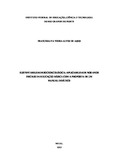Sustentabilidade socioecológica: aplicabilidade nos anos iniciais da educação básica com a proposta de um manual didático

Visualizar/
Data
2023-04-27Autor
Assis, Francidalva Vieira Alves de
http://lattes.cnpq.br/9940952840269982
Metadado
Mostrar registro completoResumo
In recent decades, environmental impacts have increased and brought negative consequences to the planet and society. Some strategies to combat these impacts are being analyzed and implemented worldwide. An example is the 2030 agenda with its 17 SDGs, which aims to protect the planet and its natural resources with the proposal of a better world for all. Therefore, it is imperative that education for socio-ecological sustainability be present in schools, as in addition to being directed towards people and the planet, it emerges as a learning strategy with the application of active methodologies. However, through the literature approach, a limited focus on socio-ecological sustainability was identified in the teaching modality of the early years of elementary school I. In this scenario, the objective was to promote socio-ecological sustainability and encourage the construction of an organic vegetable garden in Municipal School Profª Lourdes Godeiro, located in Natal/RN. The methodological procedures were through literature review and a wide search of secondary data. Data collection took place through on-site visits, direct observations, photographs and the application of a questionnaire with educators and school managers, in person, in accordance with LGPD No. 13,709/2018 and approval by the IFRN Ethics Committee. Data were submitted to the content analysis technique described by Bardin. The main results showed the teachers' lack of knowledge about socio-ecological sustainability and the 2030 agenda, in addition, the lack of training on the environment. Thus, to carry out this work, a didactic manual (ebook) was prepared on socio-ecological sustainability and the implementation of an organic garden in the school environment. The ebook was proposed for teachers to work on the theme of the environment and help students to be conscious and critical citizens, preparing them for academic and professional life. The manual is a teaching and learning strategy and with its implementation it will enable teachers and students to reduce the limited focus on the teaching-learning process, as well as contributing to the conservation of natural resources and students will be encouraged to develop learning active and will make them protagonists in the construction of their own knowledge. It should be noted that this work contributed to achieving the goals of the 2030 agenda, mainly SDGs 2 and 4, since the development of practical school learning actions provides opportunities for improvements in quality education and the promotion of practices sustainable agriculture.



